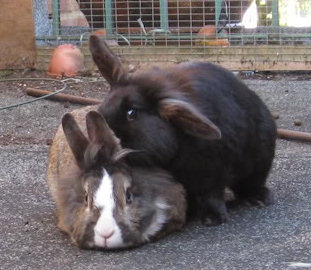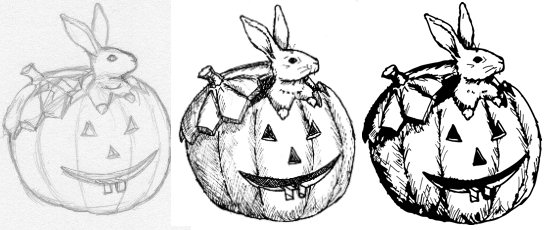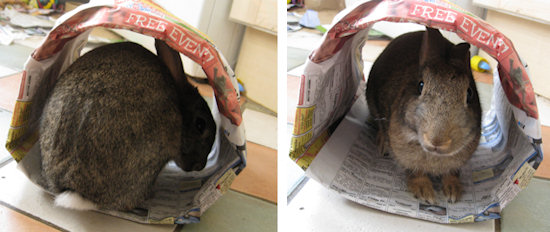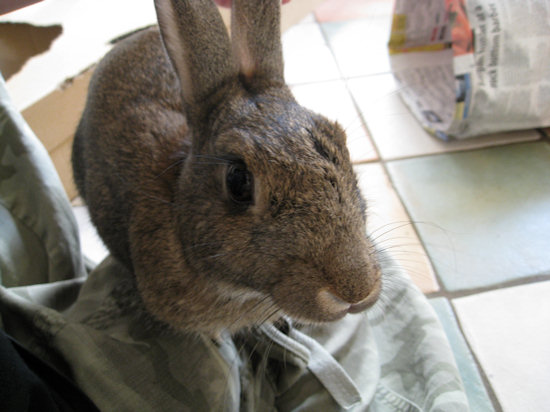 Radio 4 had a brief section on rabbits on Friday, you can listen online here (rabbit section starts around 12 minutes in). They interviewed Brigitte Lord, a Lecturer in Rabbit Medicine and Surgery and Heather Childs, a rabbit breeder/shower.
Radio 4 had a brief section on rabbits on Friday, you can listen online here (rabbit section starts around 12 minutes in). They interviewed Brigitte Lord, a Lecturer in Rabbit Medicine and Surgery and Heather Childs, a rabbit breeder/shower.
Among other topics they discussed the social behaviour of rabbits. The difference in their points of view was quite wide!
Lord emphasised that rabbits are very social animals and that having a companion allowed them to partake in natural behaviour like mutual grooming and made them feel more safe as they could share look out duties. She stated that unless their owner was at home all day to be their companion, rabbits get very lonely and that she had experienced many behaviour problems in single rabbits because of this.
Childs, on the other hand stated “I will not sell two rabbits together under any circumstances, because at the end of the day I am frighten that at sexual maturity they will rip one and other apart.” She suggested that a teddy bear would be a better choice of companion.
I think it highlights how misunderstood rabbits still are. Although, I was shaking my head through the part about never keeping rabbits together, I can easily see how she came to that conclusion. If you put a same sex, adult rabbit into the pen of another they will, in general, “rip one and other apart”. I think many pet owners arrive at the same conclusion. It doesn’t mean rabbits don’t want social companions though, you just need to understand it from their point of view.
Within a group, rabbits form separate male and female hierarchies (pecking orders). If you pick two same sex rabbits you might be lucky and end up with two on opposite ends of the social ladder that are happy with their position and with a little pushing and shoving will get on just fine. Or, you may end up with two bunnies that will fight over who is top dog and rip one and other to shreds in the process. Rather than gambolling, the best option is to pick a male and a female because they naturally make love not war (yes I agree that is a bit corny). The overwhelming odds are that a neutered male and a neutered female (loved up bunnies is good but we don’t want babies) introduced somewhere neutral will get on great.
If you do choose same-sex rabbits neutering is a must. Having hormones that constantly drive them to compete over social rank and territory is not conducive to a stable relationship! It’s certainly possible to have rabbits of the same sex living together but it can be more tricky and you need to be on the look out for potential disputes. Hierarchy isn’t set in stone, reaching sexual maturity, a new territory or competition over food can all trigger a new argument over who is top dog. Neutering reduces the competitive urges but doesn’t remove it completely.
Neutral territory is the other important factor for successful introductions. Rabbits are ferociously defensive of their homes. But then, how would you react if a total stranger appeared in the middle of your living room? My first thought wouldn’t be “ooo look a potential new friend”. Rabbit’s feel the same way; a strange rabbit invading their space is going to be treated like the enemy, not a potential friend. They much prefer to meet potential companions in a neutral area like you might go out for a cup of coffee to get to know someone.
I wish pet shops were a bit more upfront about the pros and cons of potential matches. My very first bunnies were a pair of males, who went on to fight and had to be separated – that must be nearly 15 years ago and I still speak to owners that aren’t warned about potential future problems when their rabbits hormones kick in or even when they buy a new rabbit as a companion.












